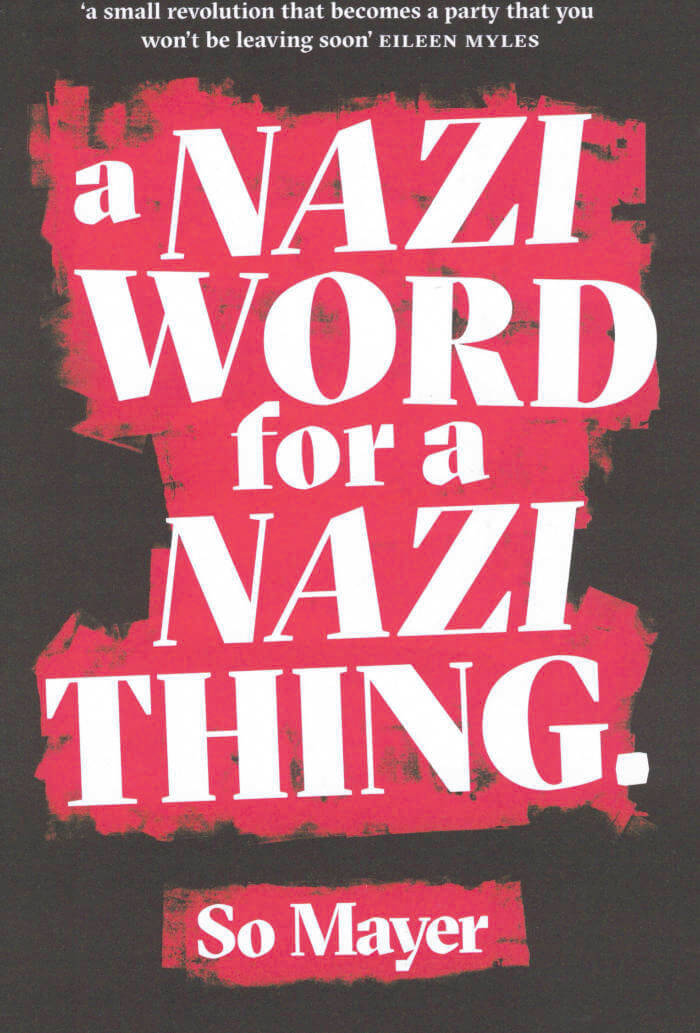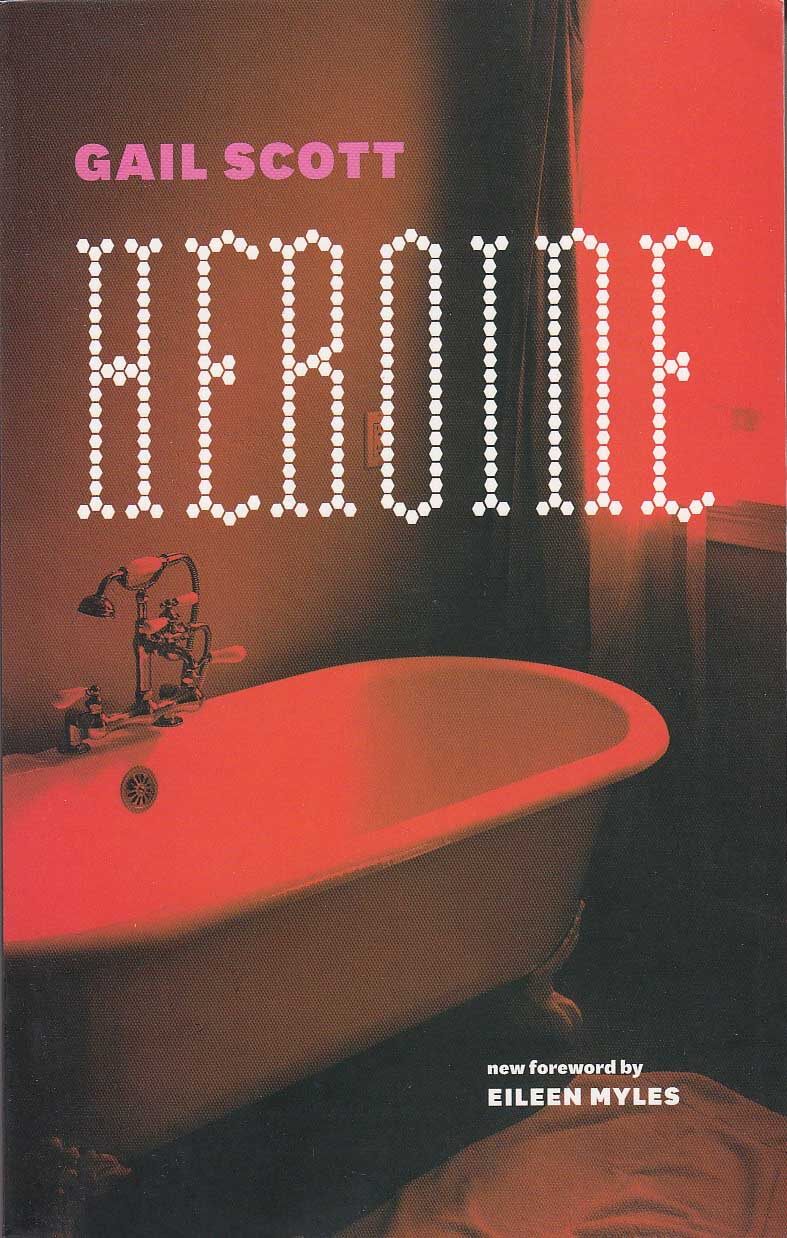Eileen Myles
Eileen Myles
And more

A Nazi Word for a Nazi Thing
An essay on art, bodies and fascism.
In an era where identity politics is being weaponised against the very people it has sought to make visible, how can we reclaim complexity?
In 1937 the Nazis staged an exhibition of seized modernist artworks. Named Entartete ‘Kunst’ – Degenerate ‘Art’ – it sought to define degeneracy, display it and destroy it.This act of violent appropriation is one episode in a long and ongoing history of the erasure of queer and non-normative cultures.
A Nazi Word for a Nazi Thing works against this erasure; it is a manifesto – a catalogue for an exhibition that could never take place. Drawing on work from dissident sexologist Magnus Hirschfeld to South African artist Zanele Muholi, as well as a century of queer cinema from Sergei Eisenstein to Pedro Almodóvar, So Mayer creates an archive of resistance.
‘This book is a small revolution that becomes a party that you won’t be leaving soon. I believe we’re living in a time of fresh erasures, systemic violences working that global pandemic to take some other bodies out. Looking so freshly at the history of queerness, sexual deviance and the long long coordinated erasures of colonialism, bigotry and transphobia the essential non binary nature of art opens up right here like the wildly singing flower it is and So Mayer’s compelling version makes sense, makes me listen.’
— Eileen Myles
‘A Nazi Word for a Nazi Thing is a reflective, creative walk through some of the worst – and best – people of the last hundred years, looking at the power of images and their relationship(s) with text. In a time of rising fascism, So Mayer highlights ways that artists have found strategies of resistance, and offers hope in historical analysis.’
— Juliet Jacques

Women, the New York School, and Other True Abstractions
"Nelson's revision of the New York School makes it not only more diverse but also more resistant of defining tropes. By showing how a motley collection of poets and artists defied the gendered conventions of both the aesthetic status quo and the so-called experimental, Nelson restores the avant-garde to its raison d'etre: to lead us past orthodoxy to discovery."—Modern Painters
"Nelson has produced the kind of boundary-busting scholarship perhaps most likely to push the field toward greater clarity concerning its parameters, urgent questions, and dramatis personae."—American Literature
“After decades of listening (enthralled, of course) to the knitted ribbon-dress observations of John Ashbery, Frank O’Hara, and James Schuyler, finally, the other serious ladies of the necessarily ‘so-called’ New York School—Joan Mitchell, Barbara Guest, Bernadette Mayer, Alice Notley, and Eileen Myles—are invited to give their full-throated response. Smart as a whip and fun as an after-hours bar, Maggie Nelson gets fresh with heretofore queerly ignored matters poetic, aesthetic, and feminist. Rearranging the school’s classroom seating, illuminating details, all the while demonstrating how crucial not-caring is to care, Nelson remaps the ‘one flow’ of poetry. Let me be blunt: reading her bravura study’s like spying Joan Jett taking Helen Vendler for a joyride.”—Bruce Hainley
“This is a terrific and necessary book. . . . Maggie Nelson charts new paths for work on the New York School and on postwar experimental writing, and her book will be necessary reading for anyone working in the area—it will reach poets and other writers, visual artists, and scholars interested in the New York School and in avant-garde or experimental work; it will reach readers interested in women’s contributions to the arts, urban culture, and the history of New York City.”—Susan Rosenbaum, University of Georgia, author, Professing Sincerity: Modern Lyric Poetry, Commercial Culture, and the Crisis in Reading
“So many times over the years I’ve been asked, What’s it like to be a woman in rock music? It’s always been sort of a paralyzing question—to answer it is to give the question itself meaning. Maggie Nelson here opens it all up for examination with this incredibly timely and astute book.”—Kim Gordon of Sonic Youth
“Maggie Nelson is deft and revelatory in bringing sociological as well as psychological, stylistic, and political insights to bear on her title terms, ‘women’ and ‘the New York School.’ She lays bare an obscured history, performs imaginative and incisive readings of careers as well as books and poems, and foots her way with exciting skill through the overlapping minefields of professional, national, and sexual politics.”—Eve Kosofsky Sedgwick, author, A Dialogue on Love
In this whip-smart study, Maggie Nelson provides the first extended consideration of the roles played by women in and around the New York School of poets, from the 1950s to the present, and offers unprecedented analyses of the work of Barbara Guest, Bernadette Mayer, Alice Notley, Eileen Myles, and abstract painter Joan Mitchell as well as a reconsideration of the work of many male New York School writers and artists from a feminist perspective.
With contagious enthusiasm, Women, the New York School, and Other True Abstractions ranges widely and covers collaborations between poets and painters in the 1950s and 1960s; the complex role played by the “true abstraction” of the feminine in the work of John Ashbery, Frank O’Hara, and James Schuyler; the intricate weave of verbal and visual arts throughout the postwar period, from Abstract Expressionism to Pop to Conceptualism to feminist and queer performance art; and the unfolding, diverse careers of Mayer, Notley, and Myles from the 1970s to the present. Along the way, Nelson considers provocative questions of anonymity and publicity, the solitary and the communal, the enduring and the ephemeral, domesticity, boredom, sex, and politics.
By asking us to rethink the ways in which we conceptualize “schools” and “avant-gardes” and eventually drawing our attention to larger, compelling questions about how and why we read—and how gender and sexuality inform that reading in the first place—Maggie Nelson not only fills an important gap in the history of American poetry and art but also gives an inspired performance of the kind of lively, audacious, and personally committed criticism that befits her subject.

MAL, Nº 1: That Obscure Object
Kathryn Maris, Maria Dimitrova
On desire and its objects in two essays, a short story and three poems. Featuring illustrations by Ana Kirova.
First published November 2018
The inaugural of Mal Journal features an essay by Anne Boyer on infatuation and literary creativity (from Dante's obsession with Beatrice to Chris Kraus's with Dick); an essay by Juliet Jacques on écriture trans-féminine (trans writing as genre); a short story by Saskia Vogel; and poetry by Eileen Myles.

a queer anthology of wilderness
Featuring Zoe Leonard, Eileen Myles, Jimmy DeSana, Princess Julia, Olivia Laing, Simon Costin, Timothy Thornton, Mary Manning and many more. Published 2020.

Over there: a queer anthology of joy
Anthology number two asks what is joy? Is joy possible in the world today? If so, how do queer people imagine or experience it? Over 30 writers, artists and performers consider queer joy with contributors including Eileen Myles, Wayne Koestenbaum, Hilton Als, AA Bronson, Timothy Thornton, Sophie Robinson, Eley Williams and Honey Dijon.

Zones Mortes
First French translation of Shulamith Firestone's first novel.
Originally published by Semiotext(e) in 1998, Airless Spaces is Shulamith Firestone's first novel. She writes this short stories gradually moving away from a career as a feminist activist; while finding herself increasingly close to a state of breathlessness. The stories center around people in the grip of a seemingly endemic poverty in New York, worn out by the back and forth of psychiatric hospitals and a sclerotic daily life. On the back cover of the original edition, we read the words of the poet Eileen Myles: “In the century I'm most familiar with, the 20th, the explosion was never-ending, the pieces tinier and tinier. Shulamith Firestone, in her radical insider's tale, informs us repeatedly like lightly pelting rain that all of us are vanishing in a century of institutions that take and take until everyone has gone away and there's no one left to shut the door.”
The French edition that we offer here, in a translation by Émilie Notéris, is accompanied by a text by Chris Kraus, author and first editor of the book.
Shulamith Firestone (1945 - 2012) is a feminist writer, activist and artist. After studying painting at the Art Institute of Chicago, she moved to New York where she co-founded the feminist groups New York Radical Women (1967), Redstockings (1969) and New York Radical Feminists (1969). In 1970, when she was only 25 years old, she publieshed the book The Dialectic of Sex: The Case for a Feminist Revolution. Firestone theorizes cybernetic communism as a system that enables the liberation of women, while at the same time putting an end to biological and social inequalities linked to reproduction and the education of children, in particular through technological emancipation.
published in May 2020
French edition
12,5 x 19,5 cm (softcover)
154 pages

Meet Me There
Samuel Ace’s / Linda Smukler’s Meet Me There is the third volume in Belladonna*’s Germinal Texts series—works that trace feminist avant-garde histories and the poetic lineages they produce. Meet Me There is a paired republication of Normal Sex (Firebrand Books, 1994) and Home in three days. Don’t wash. (Hard Press, 1996).
In the present edition, the texts are accompanied by a new introduction and poem by Samuel Ace, and by a collection of short essays and reflections on Ace and Smukler’s poetics by Cameron Awkward-Rich, Ari Banias, Kay Gabriel, Andrea Lawlor, Eileen Myles, Joan Nestle, Pamela Sneed, TC Tolbert, and Yanyi.
Meet Me There brings together Ace / Smukler’s remarkable explorations of the interplay of language, desire, sex, and identity, and repositions this work, 25 years later, in the midst of burgeoning contemporary conversations about gender, sexuality, sociality, language, politics, and poetics.

Heroine
In a bathtub in a rooming house in Montreal in 1980, a woman tries to imagine a new life for herself: a life after a passionate affair with a man while falling for a woman, a life that makes sense after her deep involvement in far left politics during the turbulent seventies of Quebec, a life whose form she knows can only be grasped as she speaks it. A new, revised edition of a seminal work of edgy, experimental feminism. With a foreword by Eileen Myles.

My Mother Laughs (UK Edition)
In 2013, the filmmaker Chantal Akerman's mother was dying. She flew back from New York to Brussels to care for her, and between dressing her, feeding her and putting her to bed, she wrote. She wrote about her childhood, the escape her mother made from Auschwitz but didn't talk about, the difficulty of loving her girlfriend, C., her fear of what she would do when her mother did die. Among these imperfectly perfect fragments of writing about her life, she placed stills from her films. My Mother Laughs is both the distillation of the themes Akerman pursued throughout her creative life, and a version of the simplest and most complicated love story of all: that between a mother and a daughter.
Translated by Daniella Shreir with an introduction by Eileen Myles and afterword by Frances Morgan.